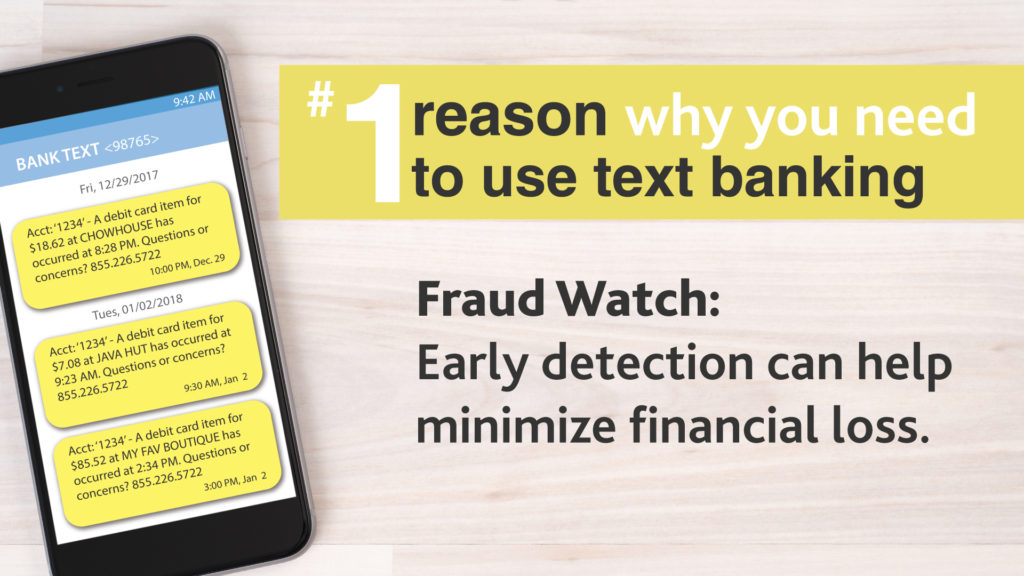
Without Risk There is No Reward

Mary Wood
Wealth Advisor
NMLS#
Wealth Advisor
NMLS#


Remote Deposit Capture allows you more time with customers.

When I think of small town local businesses, I’m reminded of Mayberry from The Andy Griffith Show. In Mayberry, everyone is treated like family. Life was slower and townsfolk looked after one another with genuine care.
Things are little bit different now, but even in our fast-paced modern world, the spirit of Mayberry can still exist at your business. It begins by cutting down on the time you spend away from your customers.
Seriously.
Ask your bank about Remote Deposit Capture (RDC)*, which lets you process and deposit checks from your customers into your bank account without leaving the office.
Let’s look at two business owners. Are you business owner A or B?
Business owner A: You collect checks. Fill out a deposit slip, adding up your total once, twice and however many times until it balances. You leave your shop and drive to the bank. You wait in line to make your deposit. Then, you head back to the shop; maybe run an errand on the way.
Business owner B: You don’t have time to run the bank every day, so your checks pile up in a drawer until you make your weekly trip. Did you know the longer a check sits un-deposited, the higher risk it may bounce?
Both business owners can improve efficiency with the convenience of RDC. Plus, they can keep their cash flow going by adding funds to their accounts quicker.
Did I mention you can save money and possibly a lot?
If you want to see just how much, check out the RDC Business Value Calculator, available at remotedepositcapture.com. Enter in a few details and you can see your personal cost savings for mileage, labor and productivity by using RDC.
Miles cost money. If your bank is just one mile from your business, that is two miles a day round trip, 10 miles per week. That’s 520 miles a year; and with the standard mileage rate at 54.5 cents, you’re spending nearly $283 a year traveling to the bank. How far are you from your bank?
Time is money. If an employee makes $10 an hour and they spend half an hour a day processing your payments, you’re paying roughly $1,300 in wages for trips to the bank each year.
Things have changed since Opie walked the streets of Mayberry, but one thing remains the same – the value of quality customer service.
RDC lets you focus on building relationships with your customers by spending less time managing your daily finances.
Ask your banker for details.
Our business services representatives are happy to answer your questions, even if you are not an RCB Bank customer. Connect with a business services representative in your area.

You’ve likely heard about the new tax plan and the changes coming to our tax code. I am not a certified public accountant (CPA) and cannot speak to how this may directly affect you individually, but I can share how the changes may affect your mortgage tax deduction.
One benefit of home ownership is being able to deduct your property taxes and mortgage interest on your income taxes.
For example, let us say you buy a home for $275,000 and the taxable value of the home is 1.25 percent of the sales price. On a mortgage at 80 percent loan-to-value accruing interest at 4 percent, you can expect to pay around $8,700 in interest and $3,400 in taxes, a total of $12,100, the first year. This amount will decrease each year as you pay down your principal.
Under the current tax code, the standard deduction is $6,350 for single filers and $12,700 for married filing jointly. If you had no other deductions, it would benefit you to itemize if you were single but not if you were married filing jointly.
The proposed tax plan will increase the standard deduction for single filers to $12,500 and married filing jointly to $24,000.
Using our example, the $12,100 mortgage deduction falls below the standard deduction for both single and married filing jointly.
Owning a home is an American dream for many people, and there are benefits to home ownership other than a tax break. Before you decide to purchase, be sure to look at the full picture of ownership.
With many current deductions and potential phase-outs of those deductions if the new tax proposal passes, it’s important to do your homework. Talk with your CPA and ask them to show you a future tax plan based on the proposed law.
When you decide to buy or refinance, first talk to a local lender. The more knowledge you have about the mortgage process, available loan options and your individual qualifications, the more satisfying your home buying experience will be.
Lenders at RCB Bank are happy to help answer questions even if you are not a customer. Give us a call or visit our online Mortgage Center.

Fraud can happen to anyone. It happened to me and text banking tried to warn me.
I was out of town. I noticed two purchase alerts in my messages. My wife and I share an account and she had recently been to a craft fair, so I assumed they were hers. I was in a hurry and did not verify the transactions. My mistake. A couple of hours later, my bank called to inform us these were fraudulent charges on my wife’s card. Luckily, they caught it quickly and canceled her card before other fraud occurred.
Fraud departments are great at what they do, but so are fraudsters. It’s ultimately up to me to keep track of what is happening on my account. Text banking allows me to monitor account activity quickly and easily throughout the day from my phone. If I don’t recognize an expense, I can check it out right then. Detecting fraud early can help minimize loss.
Many major credit card companies also offer text alerts. Let text banking help you guard your money.
You can use text banking to check account balances, transfer money between accounts and notify you when your balance falls below a specific dollar amount. You can pick and choose which alerts you want to receive. Smartphone and Wi-Fi not required.
Learn more ways to protect your money at RCBbank.com/GetFit.
For more information about text banking and to read frequently asked questions, visit our Text Banking page.
To sign up for text banking, visit any of our RCB Bank locations.
Message, data rates, fees, and other transfer restrictions may apply. Funds may not be available immediately. Delivery of alerts may be delayed for various reasons, including service outages affecting your phone, wireless or internet provider, technology failures, and system capacity limitations. Any time you review your balance, keep in mind it may not reflect all transactions including recent debit card transactions or checks you have written.
Opinions expressed above are the personal opinions of the author and meant for generic illustration purposes only. Message, data rates and fees may apply.
2 ways to build your wealth with little effort.

By Jocelyn Wood, RCB Bank
You want to save more money.
The truth is you can save more money.
The struggle is you want things now. Waiting is hard. Saving money requires discipline.
What if saving could be easy?
Here are two ways to build your wealth that involves little effort.
Direct Deposit – Ask your employer to deduct a certain amount of money from your paycheck each month and transfer it into a savings or retirement account. When you receive a pay raise, transfer that to savings too. It’s called direct deposit, and the only discipline required is initiating the process.
While you may not think you have money to set aside, you do. When money is transferred before you see your income, you’ll soon forget it. You’ll adjust to living on the money you do see. And you’ll feel less stressed when you see your savings grow. Ask your company’s human resource department for details.
Auto Money Transfer – Schedule an automatic money transfer from your checking account to a savings account through your online banking or mobile banking app. Set it up to recur monthly, or weekly for faster savings.
If you’re nervous, start with a small amount. Transfer the money into an account you don’t have easy access to, no debit card, no checks.
Not convinced you have the funds? Do this. Call your cell phone and TV providers, insurance companies and others and ask how you can reduce your bills. Schedule the differences you save each month to transfer to your savings account. You can set up an automatic transfer in 10 minutes or less. Ask your bank if you need help.
Choose to take control of your financial well-being. Then set the cruise control.
Get financially fit

By Jocelyn Wood, RCB Bank
This is the year you’re going to take charge of your money. No more rationalizing overspending. No more excuses why you can’t put money into savings. No more regrets.
Everyone can save more money.
The question you have to ask yourself is what kind of life do you want? Do you want to be debt free? Do you want those new black leather boots? Do you want to retire comfortably? Do you want the newly released smartphone? Do you want to stop living paycheck to paycheck? Do you want your daily large caffe latte from your favorite coffee shop?
Saving money is a personal choice only you can decide, and making the commitment takes effort. It requires discipline and self-control, but the end result – more money in your savings, a larger down payment on a home or being debt free – is worth your diligence.
Here are three practical tips to help you change your attitude about spending and start thinking like a saver.
If you struggle with sticking to a budget or tracking your expenses, try this: save an amount equal to whatever you spend on nonessential indulgences. If you want your morning java, put $4 in a jar. If you plan to eat lunch out, put $8 in jar. You will literally see your spending habits and potential savings.
If you can’t afford to save the matching funds, you can’t afford whatever it is you want.
Before you spend your hard-earned money, take the cost of the item you want and divide it by your hourly wage. If you want a $90 pair of boots and you make $10 an hour, are those boots worth the nine hours of work?
Also, pay yourself first. That means put money aside from every paycheck into a savings or retirement account. Saving even $25 a month adds up. Set up automatic savings through a direct deposit or money transfer. You may surprise yourself how fast your savings grows when you put it on auto-pilot. Ask your bank for more information.
Start thinking like a saver. Never purchase expensive items on impulse. Think over each purchase for at least 24 hours. During that period, do steps one and two. This will help you consider how necessary the item is that you want to buy. It will also help you have fewer regrets about purchases and more money for savings.
You don’t have to do it alone. Find someone who will help you stay on track of your savings goal. Check out AmericaSaves.org, a site dedicated to helping individuals save money, reduce debt and build wealth. You can take the savings pledge and set up text alerts to receive encouraging money saving tips targeted to your specific goal.
Also, ask your bank about products and services that offer money-management tools. Get financially fit and take charge of your money.

Is your child leaving the nest? Do they fully understand the daily financial issues that will soon become their reality? It’s never too early to start the conversation. Here are six money tips to teach your children before they leave home.
The price tag is rarely the actual cost. Talk about hidden fees, taxes and interest. Talk about personal expenses – utilities, car payments, mortgage, and unexpected purchases that can lead to financial trouble if you don’t plan for them, like auto repairs and medical expenses.
Building wealth is not about how much money you make, it’s about how you manage the money you have. Money flows out faster than it flows in. Learn to spend less than you earn. Plan for purchases, comparison shop, negotiate terms and fees and save up money before buying things.
Talk about the pros and cons of credit cards. One missed credit card payment can set you on a course toward long-term debt. Misuse of credit cards can also hurt your ability to take out a loan for a car or house. Don’t be afraid to share your personal experience with credit card misuse or debt and the sacrifices you had to make to rise above it.
You will never have enough money to buy everything you want. Choose wisely. Is instant gratification more or less important than a comfortable lifestyle? Today’s choices will affect your future financial well-being. Again, share stories of choices and consequences.
The easiest way to build wealth is to set up automatic savings. Enroll in payroll direct deposit. Schedule recurring automatic money transfers from checking to savings. Start small and increase with pay raises. If you learn to put money aside and live below your means when you are young, it will be easier to build wealth as you move up the ladder.
Most adults in or nearing retirement wish they had saved more money. Nearly half of Americans have no retirement savings and still have to work when they are 70 and 80 years old. The younger you start saving, the greater control you’ll have over your financial well-being. Talk to your teens about your personal retirement preparations.
However you decide to prep your kids for the real world, be sure money is a topic of conversation.
Opinions expressed above are the personal opinions of the author and meant for generic illustration purposes only. Member FDIC.
And how to fix them.

Purchasing a home is one of the largest investments you’ll make, and the emotions wrapped around that decision can range from excitement to fear, from joy and to frustration. Enjoy a less stressful homebuying experience by avoiding these common mistakes.
The joy of homebuying is house hunting, and often it is a homebuyer’s first step. The problem is this opens the door to potential heartache when the home you fall deeply in love with doesn’t fit in your budget.
The fix: The first and most important step in homebuying should be to get pre-approved for a loan. Knowing and understanding your budget allows you to shop the neighborhoods in your price range and help you avoid yearning for homes you cannot afford.
Buying a home based on your maximum loan qualification is a potential set up for financial struggles. Loan eligibility is based on your gross income, earnings before taxes and withholdings. Your monthly mortgage payment is made from your net pay, your take home cash. What you qualify for and what you can actually afford to pay each month may be different depending on your living expenses and spending habits.
The fix: Work from your budget. Figure your current take home pay and expenses. Then determine a comfortable payment you can afford that will also allow you to put away money each month for emergencies, retirement or other financial goals. Ask your lender to factor your goals and budget into your loan pre-qualification.
Online lenders may or may not live in your area. They may be offering teaser rates for which you may not qualify. While scoping out the field online will give you a general idea of current rates and options, shopping for a home loan is a process you should do locally in person.
The fix: Speak with a local mortgage banker or two. They are informed on specific loan options available in your particular area. They can provide a loan estimate tailored to your individual needs, and can work with you directly to help you get the best option based on your qualification.
When purchasing a home you need to consider what might happen in the future. Might your job relocate? Are you planning on kids? Are you buying in a good school district? It’s easy to live and shop in the now, but your decision may cause distress down the road.
The fix: Know your personal and family goals and shop accordingly. Choose a home you can grow in or one that is marketable to sale in the future, if you need to make a move.
Buying a home doesn’t have to be complicated or daunting. When you decide it’s time to buy or refinance a home, first talk to a local lender. The more knowledge you have about the mortgage process, available loan options and your individual qualifications, the more satisfying your homebuying experience will be.
Lenders at RCB Bank are happy to help answer questions even if you are not a customer. Give us a call or visit our online Mortgage Center.
Three tips to avoid being a victim

I cannot stress enough the importance of using caution when it comes to using the internet, checking your emails and answering phone calls. Criminals are savvy con artists who steal billions of dollars from people each year.
Fraudsters are masters of age-old deception tricks. Often times, they persuade victims to hand over personal information and money willingly through telemarketing, Ponzi schemes and internet scams.
Avoid becoming a victim and take steps to protect you and your money.
If you receive mail or a phone call stating you’ve won a free gift and all you need to do is pay postage or a small deposit, walk away. Con artists use convincing telemarketing to deceive victims. Mail may look like official letterhead from well-known companies. Criminals may cunningly pretend to represent local charities.
Adopt these principles:
Fraudsters like to frighten victims into thinking they owe money to the IRS, or threaten arrest if they don’t pay an outstanding balance. Criminals can get their hands on public records and personal information, from the internet and social media networks, and create plausible schemes. Before you act out of fear, seek the truth.
There are hundreds of scams – phishing, texting, pop-up windows, downloads, skimming and spyware – to trick you into revealing personal information. Assume anything you post or send online or via phone is public. Take these precautions to protect yourself:
Criminals do not discriminate. All ages and demographics are at risk. As Ben Franklin once said, “An ounce of prevention is worth a pound of cure.” The FTC and Federal Bureau of Investigation, FBI.gov, offer tips and advice for fraud protection.
We are happy to answer any questions you may have. Call us at 855-BANK-RCB or visit your local RCB Bank location.

By the year 2040, it is projected that 14.6 million Americans will be 85 years old or older. This is triple in population from 6.5 million in 2014, according to the Administration of Aging¹.
Are you prepared financially to live longer? If you’re age 20 or older, retirement planning should be one of your top priorities. Not sure where to begin? I asked Nate Haberman, AAMS® Financial Advisor at RCB Wealth Management to share a few tips.
Use your current expenses as a starting point. Don’t forget to factor in items like travel, new vehicles and healthcare expenses.
“A financial plan does not have to be complicated,” Haberman said. “Its purpose is to help you get from where you are to where you want to go, as well as improve the odds that you won’t outlive your money in retirement.”
Invest in your employer-sponsored retirement plan or an individual retirement account.2
Start now.
“It can be hard to plan for retirement when you are living paycheck to paycheck,” said Haberman. “But, a small amount is better than no amount. Setting aside a little bit each month will add up in the long run, especially if your employer matches a percentage of your contributions.”
Prepare for the unexpected and avoid tapping into your retirement savings.
“At one time or another, an expense will come up that you didn’t plan for – car repair or hospital visit,” said Haberman. “An emergency fund is there to help manage the financial risks of unforeseen expenses and potentially lessen some stress. Plus, early withdrawals from retirement accounts often have tax penalties assessed to them.”
Life happens. Plan, prepare, review and adjust regularly in order to stay on track of your goals.
“A professional advisor can assist you through realistic expectations in your planning, while taking into consideration items like the age you plan to retire, inflation and taxes,” said Haberman. “A professional can walk you through all the available tools so you can better understand your options.”
While having a plan doesn’t guarantee a successful retirement, it may help you alleviate possible hardships, and allow you to live the life you want during your golden years.
Ways to improve your car buying experience

Buying a car can be intimidating, even if you’ve done it before. Sales people, negotiations, paperwork – it can be a whirlwind of emotions. For most people, buying a car is the second largest purchase they will make in their lifetime. A little preparation before you step onto the dealership floor may improve your car buying experience.
If you know the financial institution you will be using to finance your next car, get preapproved for a loan so you know your budget upfront. Car shopping is less complicated when you know your maximum purchase price. It’s easy to get blinded by a shiny new car and all the extras only to find it is out of your budget.
When you have your financing approved, you can focus on other aspects, like car reviews and purchase price to ensure you are getting the best deal.
There are a number of websites to research the dependability and safety of cars. Find out what similar cars are selling for in your area. Then, compare your potential purchase to its value on websites such as Nadaguides.com.
If you will be trading in your car, know the payoff amount and make sure the dealer will pay off your loan in full. Research the value of your trade-in to know what you should expect before going into the dealership.
Don’t overpay. An important, and often overlooked factor in auto financing, is the loan term. The loan term is the number of months you have to pay off your car. Many dealerships will finance a car for seven or even eight years. This may look good on paper but you must think long term.
Before you sign, ask yourself:
People forget to ask these questions before they purchase, and some end up upside down in their car. This means their loan payoff is more than the car is worth and they have negative equity.
Watch your overall interest cost. While financing a longer term may allow you to buy a more expensive car at a lower monthly payment, you will also pay more interest on long-term loans. Always compare the potential outcome and consider what is best for your future car buying experiences.
You decide where to finance your car, not the dealership. While dealerships may have a competitive rate or loan term, ask yourself some questions.
You hold the cards when it comes to where you finance your vehicle, so do what feels comfortable to you.
Our lenders are happy to answer your questions, even if you are not an RCB Bank customer. Connect with a lender in your area.
5 money lessons from grandparents

By Jocelyn Wood, RCB Bank
Every year, my granddad would sit his grandkids down at the kitchen table and pour out a big jar full of coins he’d saved. We could have these coins but only after we sorted them, divided them equally and then rolled them. As little children, it felt like hours to complete this task, but the reward was a bag full of money.
When grandparents talk, we ought to listen, especially when it comes to money. They’ve lived a lifetime earning, spending and saving money. They can teach us a thing or two about the value of a dollar and the importance of saving for a rainy day. Here’s five lessons learned from grandparents.